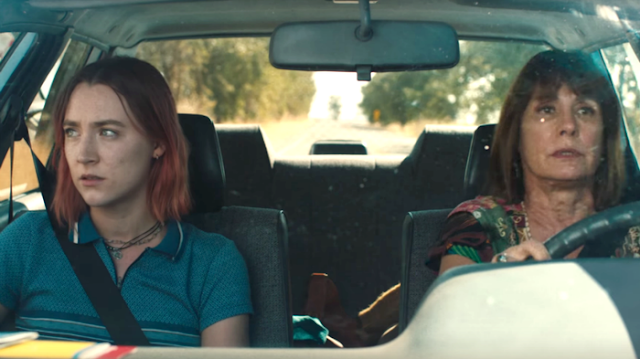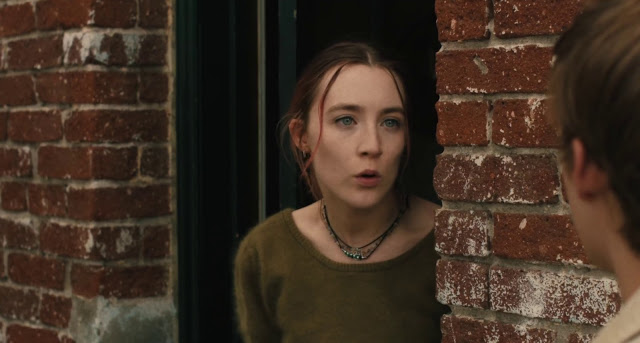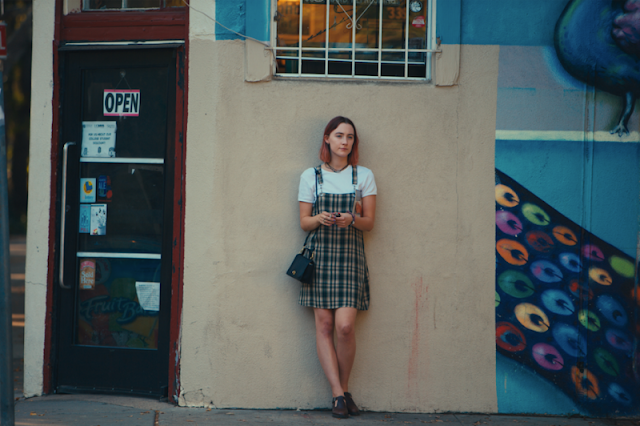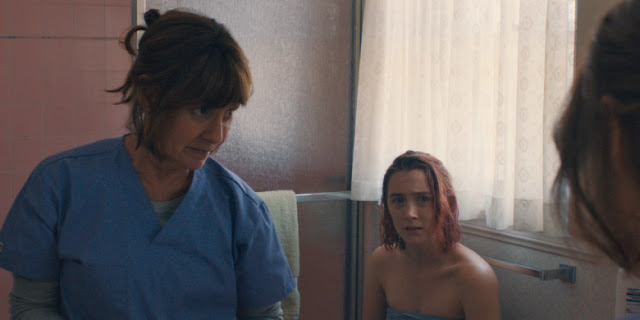There is a blink-and-you’ll-miss-it moment late in Lady Bird, Greta Gerwig’s funny and piercing and achingly humane directorial debut, that perfectly encapsulates the movie’s warmth and lucidity. Christine, the tempestuous teenager at the center of Lady Bird who insists that everyone refer to her by the film’s title, is repainting her bedroom. As a ribbon of white varnish rolls over the formerly pink wallpaper, it obliterates the printed names of two boys that Lady Bird had previously scrawled into the wall. Those names, which once filled Lady Bird with ardent longing, have been erased, the desires they inspired living on only as relics of her own memory. The implications are plain: Time passes. People change. And life—forgive me if you’ve heard this before—goes on.
Movies, however, must end. Yet when the final frame of Lady Bird cut to black, I was not ready to be done with it. I preferred to linger a few moments longer in the finely textured world that Gerwig had conjured with such candor, intelligence, and care. Perhaps I was simply overpowered—by the film’s sincerity, by its humor, by its grace—but I like to think that I was expressing fidelity to one of the clichéd-but-undeniable truths that this movie articulates with such heartbreaking clarity: When you love someone, it is hard to let them go.
Lady Bird is played by Saoirse Ronan in a performance of such fierce poignancy and brittle honesty that it would count as incredible if the actress hadn’t already established her bona fides a half-dozen times over. Every new Ronan appearance doubles as an opportunity to discover new facets of her kaleidoscopic talents, and here, she casts off all vestiges of the wholesome sweetness she recently brought to her role as an Irish immigrant in Brooklyn. With dyed red hair complementing her crystal-blue eyes (not to mention a flawless American accent), Ronan inhabits the part with a remarkable lack of vanity, emphasizing Lady Bird’s selfishness and erraticism without ever diminishing her central dignity. Unlike Lady Bird, I’m not a Catholic, but my anecdotal understanding is that canonization requires three miracles; with her performance in Lady Bird following her extraordinary work in Brooklyn and her unforgettable turn a decade ago in Atonement, perhaps we should start referring to Ronan as Saint Saoirse.
Not that Lady Bird’s behavior is especially virtuous. During the movie, which unfolds over its heroine’s final year of high school, she is by turns cruel, volatile, passionate, melodramatic, tender, and obnoxious. In other words, she’s a teenager.
This means that Lady Bird occupies the well-trod, dangerously familiar terrain of the coming-of-age story. It proceeds both as a series of sexual firsts—first kiss, first love, first lay—and, more broadly, as a symbolic journey from adolescence into adulthood. This is of course recognizable territory, but Gerwig, working from her own semi-autobiographical script, nimbly avoids the pitfalls of cliché and contrivance, lending rich specificity to her narrative without robbing it of its universality. In some ways, the movie functions as an eerily customized time machine, not because of its yesteryear setting (“The only exciting thing about 2002 is that it’s a palindrome,” Lady Bird grouses), but because it transports adult viewers to the vulnerable era of their own youth. Watching the film’s sensuous evocation of high school life—the emotional confusion, the mutability of friendships, the frustration with parents and teachers—you are certain to glimpse a remnant of your past self. But at the same time, Lady Bird is decidedly about Lady Bird.
Gerwig plainly respects her subject, and her medium as well. For a work of such intimacy and modesty, Lady Bird is deceptively immaculate in its technique. Sam Levy’s warmly toned cinematography bathes the images in a golden hue, and he and Gerwig are gratifyingly disciplined with the camera, eschewing the vérité temptation of shooting everything in wobbly handheld; instead, the framing is methodical and precise. The same goes for the editing, which condenses an eventful year-in-the-life account into a smoothly paced 93 minutes. Jon Brion’s delicate score is gentle but never treacly. (Speaking of music, the young-millennial soundtrack—which includes contributions from Alanis Morissette, Justin Timberlake, and Dave Matthews Band—somehow manages to tap into the raw power of these pop songs without seeming mocking.) Rare for a first-time filmmaker, Gerwig uses craft to intensify the impact of Lady Bird’s story, not to call attention to herself.
As if anyone else could be the center of attention. A well-meaning narcissist at heart, Lady Bird has problems that are thoroughly normal, which means that, for her, they feel utterly insurmountable. Chief among them is the encroaching prospect of college, which Lady Bird heralds as an opportunity to break free from her humdrum Sacramento existence and discover her true self at an east-coast liberal-arts school. But her family’s shaky finances—her mother, Marion (Laurie Metcalf, wonderful), regularly works double shifts as a nurse, while her father, Larry (Tracy Letts, perfectly understated), has just been laid off—and her own lackluster academic performance combine to render such a scenario unlikely. One of the many smart elements of Gerwig’s script, and of Ronan’s performance, is that they refuse to paint Lady Bird as a creature of extremes; she is neither a precocious, misunderstood genius nor a rebellious delinquent. She is instead, in terms of both temperament and intellect, fairly typical.
Which is not to suggest that she is ordinary. Again, Gerwig is telling a specific story here, and besides, Ronan’s performance is too electric for Lady Bird to be reduced to a mere avatar of adolescent angst. Rather than loading the plot with artificial obstacles, Gerwig lets things play out organically, resulting in a soothing lost-in-time quality that only heightens Lady Bird’s various mishaps. And so, while Lady Bird’s various dalliances with boys—she initially pursues Danny (Lucas Hedges), a sweet-tempered classmate who excels in the school’s cheesy musical productions, but is later drawn to Kyle (Timothée Chalamet), a blithe pseudo-communist who mistrusts cell phones—carry the familiar sting of romantic disappointment, that sting lands in ways both sensitive and surprising. Similarly, Lady Bird’s casual disloyalty results in the fraying of a friendship that Gerwig is careful not to overplay, leading to a resolution at a dance that is glorious in its feminine solidarity. As a testament to Gerwig’s generosity, the film is dotted with distinctive supporting characters—a sympathetic nun (Lois Smith), a solemn reverend (Stephen McKinley Henderson), a queen bee (Odeya Rush)—all of whom no doubt have their own, equally complicated lives taking place off-screen.
Yet the dominant relationship in the movie—the one that supplies it with its primary power source and its frequent bolts of emotional lightning—is that between Lady Bird and her mother. Every child at some point in their life, be it for a matter of years or weeks or minutes, has hated their parents. But the dynamic between Lady Bird and Marion is richer and more complex than a simple toggling of love and hate. It is instead the perpetual collision of two unstoppable forces, a pair of strong-willed personalities who both want the same thing—Lady Bird’s happiness—but constantly disagree on how to achieve it. It’s one of the most honest and affecting parent-child relationships I’ve seen on screen, raw and jagged and terribly hurtful, yet undergirded by an unshakable devotion that they both know exists, even if they often refuse to acknowledge it. A veteran of television, Metcalf imbues Marion with an exquisitely maternal combination of fear and pride; a silent scene where she’s driving, feelings flickering across her face like rainwater, is devastating. Ronan of course matches her seamlessly, making clear that Lady Bird respects her mother, even if she also can’t stand her.
That kind of internal contradiction is typical of Lady Bird, a movie where good people do bad things, where affection and desire don’t always commingle smoothly, and where rancor can turn to rapture in the blink of an eye (or with the selection of a choice outfit). As coming-of-age stories go, it’s both refreshingly frank and genuinely hilarious. But it’s also more than that. It would be a mistake to classify Lady Bird as a love story—Gerwig perceives awkward teen romance as just one stumbling block of growing up—yet love is the sensation that it grasps so thoroughly, and inspires so effortlessly. In the film’s final scene, Lady Bird leaves someone a voicemail (recalling the killer kicker to Greenberg, which put Gerwig on the art-house map), and in so doing quietly illustrates that love isn’t the exclusive province of sexual partners. It can also flourish between a daughter and her mother. Or between a critic and a movie.
Jeremy Beck is the editor-in-chief of MovieManifesto. He watches more movies and television than he probably should.




